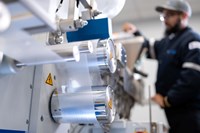Alpha Metal Finishing Adds Stainless Passivation
The new line enables the company to provide chemical passivation of customers’ parts in conformance with ASTM A967 and ASTM A380.
Share
Alpha Metal Finishing has installed a stainless steel passivation line that enables it to provide chemical passivation of customers’ parts in conformance with ASTM A967 and ASTM A380.
Passivation is a non-electrolytic process designed to maximize the natural corrosion resistance of stainless steel. It can remove surface contamination such as free-iron or dirt particles from cutting tools that can form rust or act as initiation sites for corrosion. Alpha uses nitric acid to remove the particles from the surface, and this forms an inert, protective oxide layer, the company says.
“We are very excited to begin offering passivation to our customer base, since many of them manufacture both aluminum and steel products,” says Jamie Barrus, quality assurance manager. “I have been asked many times by customers if we could provide this service.”
Chief Operating Officer Greg Wood says the company has wanted to add stainless passivation to its list of capabilities for many years.
“Passivation fits well with our business model and relationships with customers and suppliers,” he says. “It will provide another solid revenue stream and a building block to our long-term strategy.”
Alpha Metal Finishing is a family-owned company based in Dexter, Michigan, that has been providing rapid-turnaround finishing since 1976. It also offers anodizing, har-coat anodizing and chemical film coatings for markets such as medical devices, sporting goods, military, aerospace, sensors and firearms. Visit alphametal.com.
Related Content
-
Troubleshooting Alkaline Zinc
One of the most common problems that can arise when plating with alkaline zinc is an imbalance of brightener in the solution. In this helpful Ask the Expert article, Chad Murphy of Columbia Chemical discusses how different zinc metal concentrations and brightener concentrations can impact efficiency.
-
Successful South African Plater Beating the Odds
Remaining focused on quality and reliability, Team Plating Works stays profitable in a volatile and challenging economy.
-
How to Choose Between Sulfate and Chloride-Based Trivalent Chromium
There are several factors to consider when choosing between sulfate and chloride-based baths for trivalent chromium plating. Mark Schario of Columbia Chemical discusses the differences and what platers should keep in mind when evaluating options.















